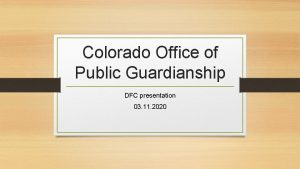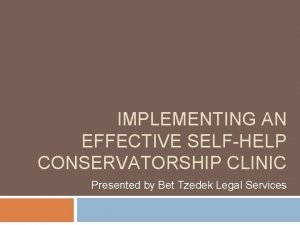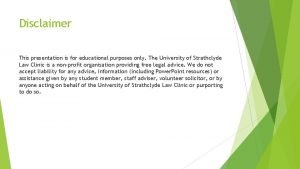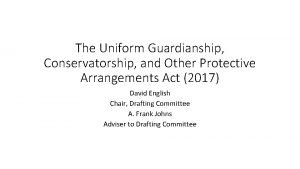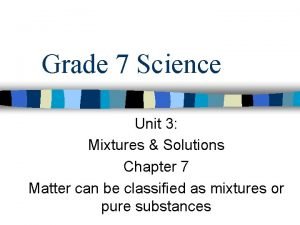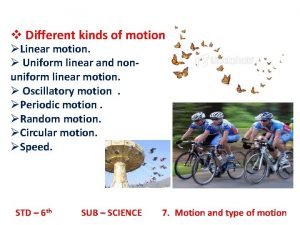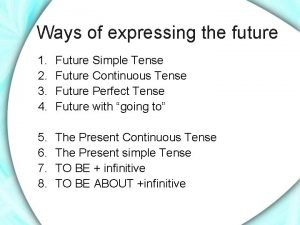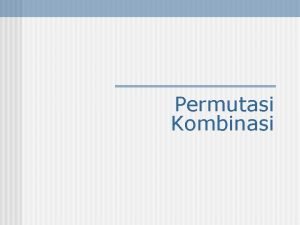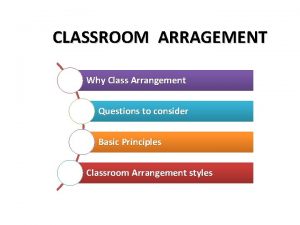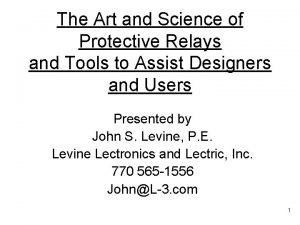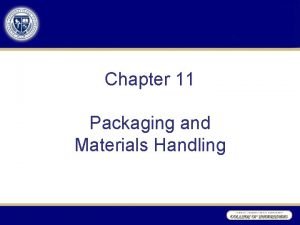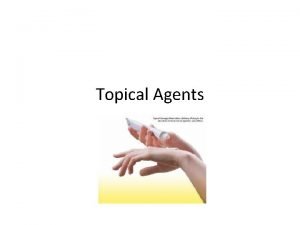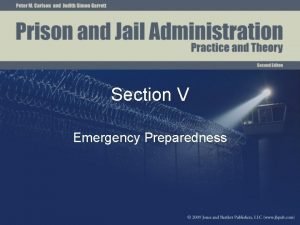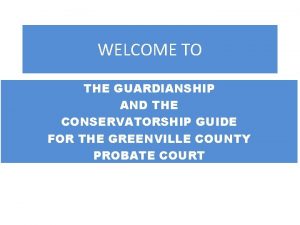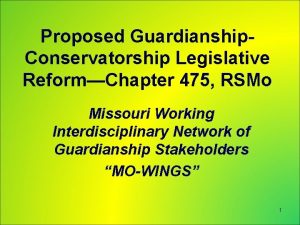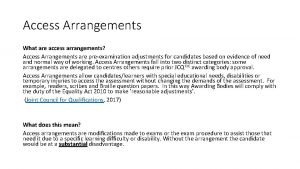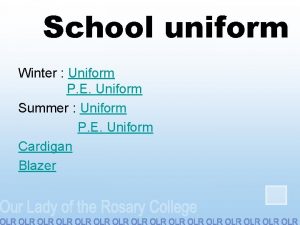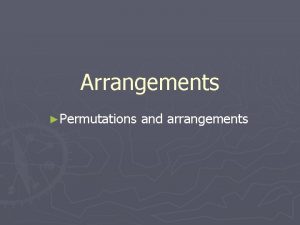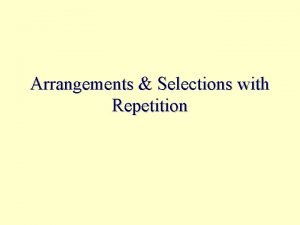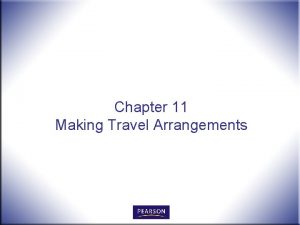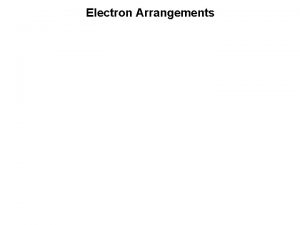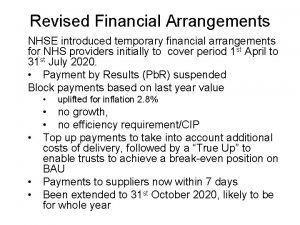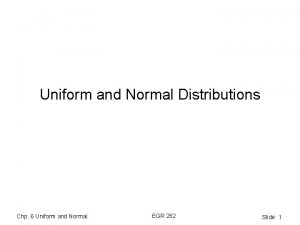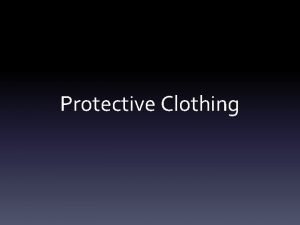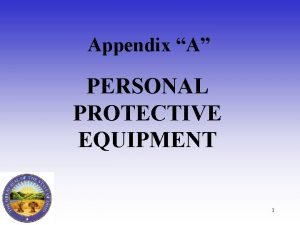The Uniform Guardianship Conservatorship and Other Protective Arrangements































- Slides: 31

The Uniform Guardianship, Conservatorship, and Other Protective Arrangements Act (2017) David English Chair, Drafting Committee A. Frank Johns Adviser to Drafting Committee

Overview • The Uniform Guardianship, Conservatorship, and Other Protective Arrangements Act was approved by the Uniform Law Commission on July 19, 2017. • This program will summarize the key reforms in light of the recommendations of the 2011 Third Guardianship Summit, the conference that led to the revision project. • A copy of the UGCOPAA can be found at www. uniformlaws. org. The ULC website page also includes an enactment kit.

What is the Uniform Law Commission • Uniform Law Commission (ULC) Non-profit organization formed in 1892 Formerly known as “NCCUSL” Commissioners are volunteer attorneys appointed by the states ULC drafts model legislation on topics where uniformity among the states is desirable • Legislative staff based at Chicago headquarters • www. uniformlaws. org. • •

I. Background and Drafting Process

50 Year History of Law Reform 1969: Uniform Probate Code (Article V on Protection of Persons Under Disability and their Property). 1982: Uniform Guardianship and Protective Proceedings Act (free-standing version of UPC Article V-introduces limited guardianship). 1997: Revised UGPPA (More protective of an individual’s legal rights; least restrictive alternative; court visitor; must take person’s views into account)

30 Year History of Conferences • Wingspread (1988) [official title of report, Guardianship: An Agenda for Reform]-still a core document behind guardianship law and practice reform. • Wingspan (2001) [articles and recommendations published in Stetson Law Review]-lead to drafting of Uniform Adult Guardianship and Protective Proceedings Jurisdiction Act. • Third National Guardianship Summit (2011) [articles and recommendations published in Utah Law Review]-recommendations focus on post-appointment issues.

The Road to UGCOPAA • October 2011: National Guardianship Network convenes the Third National Guardianship Summit at the University of Utah. • Spring 2012: Third National Guardianship Summit Standards and Recommendations are published. • 2012 -2013: ABA Commission on Law and Aging reviews the recommendations and determines which can be implemented by statute. • Fall 2013: David English and Linda Whitton prepare a proposal to revise the UGPPA. • Fall 2014: ULC President appoints a new drafting committee chaired by David English with Nina Kohn of Syracuse University as the Reporter.

Key Advisory Groups • • • Center for Guardianship Certification. ABA Commission on Law and Aging. AARP. National Guardianship Association. American College of Trust and Estate Counsel (ACTEC). National College of Probate Judges. National Academy of Elder Law Attorneys (NAELA). Alzheimer’s Association. ABA Section of Real Property Trust and Estate Law. National Disability Rights Network. The Arc. National Center for State Courts.

New Law, New Name • 1997: Uniform Guardianship and Protective Proceedings Act (“UGPPA”). • 2017: Uniform Guardianship, Conservatorship, and Other Protective Arrangements Act (“UGCOPAA”). • New Act contains separate article (Article 5) on protective arrangements, greatly increasing emphasis on alternatives compared to the prior Act.

Current Status • Text of Act approved on July 19, 2017, Style Committee process was completed on November 5, 2017, Comments are currently being worked on. • It usually takes a couple of years before enactments begin but UGCOPAA was introduced and partially enacted in New Mexico in 2018. • Predecessor UGPPA and UPC Article V have been enacted in full in about 20 states but have influenced the law in all states.

Explanation of Act’s Title • Under UGCOPAA, a guardian makes personal decisions, and a conservator manages property. • A protective arrangement is an intervention by the court that does not involve the appointment of a guardian or conservator. Examples include: • • • Ordering a particular medical treatment Placement in a particular facility Sale of property Signing a contract for care Creation of a special needs trust.

Organization • Article 1 contains definitions and general principles. • Article 2 addresses guardianship of minors. • Article 3 addresses guardianship of adults. • Article 4 addresses guardianship of both minors and adults. • Article 5 addresses protective arrangements.

II. UGCOPAA Provisions Based on Third Summit Standards

Third Summit Legislative Themes • Not all of the Third Summit recommendations are legislative in nature but those that were legislative have been included in UGCOPAA. • The recommendations/standards which are legislative in character may be categorized into the following themes: • • • Terminology [R 1. 7] Transparency of duties [R 1. 1] Reporting to court [S 1. 1, 2. 2] Fees [S 3. 1, R 3. 2] Decision-making standards, both general [R 1. 5], and as applied to decisions regarding financial [S 4. 1 -4. 6, 4. 8 -4. 9, 4. 12], health care [S 5. 1 -5. 3], and residential matters [S 6. 1, 6. 3 -6. 4].

Terminology • Recommendation 1. 7 provides: “Where possible, the term person under guardianship should replace terms such as incapacitated person, ward, or disabled person. ” • Under 1997 UGPPA, individual under guardianship was called an “incapacitated person” or “ward. ” An individual under conservatorship was called a “protected person. ” • The 2017 UGCOPAA sweeps away the old terminology and adopts a person first approach. The new terms are “individual under guardianship” and “individual under conservatorship. ”

Transparency of Duties • Recommendation R 1. 1 provides: “State statutes should set forth the mandatory duties of guardians. Court administrative rules should set forth guardian standards. • The 2017 UGCOPAA specifies the duties of guardians in more detail. See Sections 313 -317. • The 2017 UGCOPAA specifies the duties of the conservator in more detail, adapting concepts from the Uniform Trust Code and Uniform Prudent Investor Act. See Sections 414, 418 -423.

Reporting to Court • Standard S 1. 1 provides: “The guardian shall develop and implement a plan setting forth short-term and long-term goals for meeting the needs of the person—plan shall emphasize “person-centered philosophy. ” • Standard S 2. 2 provides: “The guardian and conservator shall keep the court informed about the well-being of the person and the status of the estate through personal care and financial plans, inventory and appraisals, and annual reports and accountings. ”

Implementation in 2017 Act • The 1969 UPC and 1982 and 1997 UGPPA required that conservators file inventories and accountings. Prior uniform also required that guardian shall file an annual report. • 2017 UGCOPAA adds requirement that guardians and conservators file plans within 60 days of appointment. See Sections 316, 419. • Guardian and conservator plans must take into account the individual’s preferences, values, and prior directions, to the extent known or reasonably ascertainable.

Fees • Standard 3. 1 requires advance disclosure of fees, including basis, changes, and detailed explanation. R 3. 2 specifies factors in setting fees. • UGCOPAA is similar although more flexible. Section 120 lists factors for court to consider in setting guardian’s or conservator’s compensation. Section 419 requires that conservator’s plan include a statement of how the conservator proposes to charge for each service.

Decision-Making Standards: Third Summit • The Third Summit report contains numerous standards relating to decision-making in general and as applied to health care, residential, and financial decisions. • The standards emphasize self-determination and a preference for substituted judgment.

Implementation in Uniform Act: Guardians • Section 313 (and other sections) prescribe the following decisionmaking standard for guardians. Guardians are required to: • make the decision they reasonably believe the adult would make if the adult were able unless doing so would unreasonably harm or endanger the welfare or personal or financial interests of the adult. • consider the adult’s previous directions, preferences, opinions, values, and actions, to the extent actually known or reasonably ascertainable to determine the decisions the adult would make • make the decision that is in the best interest of the adult if the guardian cannot determine what decision the person would make or the decision would unreasonably harm the welfare or interests of the adult.

. . . and for conservators • Section 418 (and other sections) prescribe the decision-making standard for conservators. Conservators are required to: • make the decision the conservator reasonably believes the individual would make if the adult were able unless doing so would fail to preserve the resources needed to maintain the individual’s well-being and lifestyle or would unreasonably harm or endanger the welfare or personal or financial interests of the individual • consider the individual’s previous or current directions, preferences, opinion, values, and actions, to the extent actually known or reasonably ascertainable by the conservator to determine the decision the adult would make • use a best interests approach if – and only if – the conservator cannot apply the above decision-making standard.

III. Selected Other Provisions

Limited Grounds • Courts are not authorized to appoint a guardian of conservator if the person’s needs can be met with less restrictive means, including supported decision-making. • UGCOPAA Section 102 defines supported decision-making as: “assistance from one or more persons of an individual’s choosing in understanding the nature and consequences of potential personal and financial decisions, which enables the individual to make the decisions, and in communicating a decision once made if consistent with the individual’s wishes.

Expanded Procedural Rights: Examples • For adults alleged to need a guardian or conservator: • Sets a higher bar for excusing attendance at the hearing • Requires explicit findings be made before certain fundamental rights are removed (e. g. , right to marry, vote) • Requires attorneys representing respondents to maintain normal attorneyclient relationship.

Visitation and Communication • Guardians for adults may not restrict the ability of the adult to communicate, visit or interact with others without: • (1) A specific court order or protective arrangement in place; OR • (2) Good cause to believe that restriction is necessary because of a rish of substantial harm. • Restrictions without court orders are limited to 7 days if the person has a family or pre-existing social relationship with the adult (60 days in other cases).

IV. Advocating for the Act

UGCOPAA: Implications for States • Vehicle for legislative change • Option 1: Adoption in full • Option 2: Selective adoption • Vehicle for advocacy • Example: Recognizes that guardianship not appropriate where supported decision-making meets an individual’s needs • Example: Recognizes right to obtain attorney for termination action

UGCOPAA: Political Landscape • Typically a bi-partisan issue • Issue isn’t “hot”. . . UNLESS there is a crisis or tragedy • Broad issue and could be very long process • Given number of disparate groups involved, can be hard to reach consensus

UPCOPAA: Potential Players • Court administration • Guardians and conservators • State Bar Association (elder law/probate and trust/family law) • Senior advocates • Child advocates • Mental health advocates • Advocates for the intellectually or developmentally disabled • Uniform law commisioners

Contact information • David English, University of Missouri, englishda@Missouri. edu • Nina A. Kohn, Syracuse University, nakohn@law. syr. edu • Diana Noel, Senior Legislative Representative, AARP, dnoel@aarp. org • Ben Orzeske, Chief Counsel, Uniform Law Commission, borzeske@uniformlaws. org • A. Frank Johns, Booth, Harrington & Johns, afj@nclaw. com
 Colorado office of public guardianship
Colorado office of public guardianship Bet tzedek conservatorship
Bet tzedek conservatorship For presentation purposes only
For presentation purposes only Conservatorship
Conservatorship Kitchen first aid
Kitchen first aid How do you classify uniform and non-uniform mixtures?
How do you classify uniform and non-uniform mixtures? Types of mixtures
Types of mixtures Aliran tak seragam
Aliran tak seragam Which type of motion
Which type of motion Types of position
Types of position 6-2 other ways of expressing the future
6-2 other ways of expressing the future Permutasi string
Permutasi string Circular arrangement questions
Circular arrangement questions Assessment and reporting arrangements 2017
Assessment and reporting arrangements 2017 Overcurrent protection
Overcurrent protection Protective packaging and materials handling
Protective packaging and materials handling Chapter 36 emergency preparedness and protective practices
Chapter 36 emergency preparedness and protective practices Packing learning objectives
Packing learning objectives Define topical agents with example
Define topical agents with example Chapter 36 emergency preparedness and protective practices
Chapter 36 emergency preparedness and protective practices Hình ảnh bộ gõ cơ thể búng tay
Hình ảnh bộ gõ cơ thể búng tay Bổ thể
Bổ thể Tỉ lệ cơ thể trẻ em
Tỉ lệ cơ thể trẻ em Gấu đi như thế nào
Gấu đi như thế nào Tư thế worm breton là gì
Tư thế worm breton là gì Hát lên người ơi
Hát lên người ơi Các môn thể thao bắt đầu bằng từ đua
Các môn thể thao bắt đầu bằng từ đua Thế nào là hệ số cao nhất
Thế nào là hệ số cao nhất Các châu lục và đại dương trên thế giới
Các châu lục và đại dương trên thế giới Cong thức tính động năng
Cong thức tính động năng Trời xanh đây là của chúng ta thể thơ
Trời xanh đây là của chúng ta thể thơ
